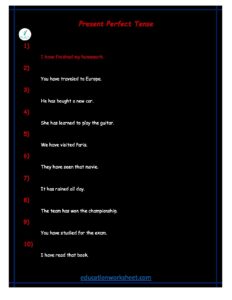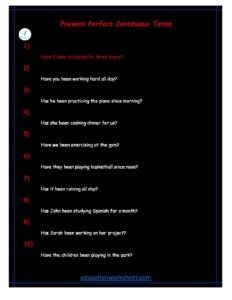how to converting Present Perfect Continuous Tense interrogative sentences to negative form 1
how to converting Present Perfect Continuous Tense interrogative sentences to negative form
Understanding the Present Perfect Continuous Tense
Before we delve into converting interrogative sentences to the negative form, let’s have a clear understanding of the Present Perfect Continuous tense. This tense is constructed using the auxiliary verb “have” (in its different forms) and the main verb in the present participle form (-ing form). The basic structure of affirmative sentences in this tense is:
Subject + have/has + been + verb (present participle form) + object
For example:
- She has been studying English for two hours.
In this sentence, “has been studying” is the Present Perfect Continuous tense construction indicating an ongoing action.
Converting Interrogative Sentences to Negative Form

how to converting Present Perfect Continuous Tense interrogative sentences to negative form
To convert interrogative sentences in the Present Perfect Continuous tense to the negative form, we need to add the word “not” after the auxiliary verb “have” or “has.” The word “not” is a contraction of “have not” (for subjects like “I,” “you,” “we,” “they”) or “has not” (for the subject “he,” “she,” “it”). The structure for negative interrogative sentences is as follows:
Have/Has + not + subject + been + verb (present participle form) + object?
Let’s break down this structure further:
- Have/Has: The choice between “have” and “has” depends on the subject. “Have” is used with subjects like “I,” “you,” “we,” “they,” while “has” is used with the singular subjects “he,” “she,” and “it.”
- Not: This is the negative marker and is essential for converting interrogative sentences to the negative form.
- Subject: This remains unchanged based on the subject of the sentence.
- Been: This is a constant part of the Present Perfect Continuous tense structure and remains unchanged.
- Verb (present participle form): This is also retained from the original interrogative sentence.
- Object: The object of the sentence, if present, remains unchanged.
Now, let’s explore this conversion process with examples:
Original Interrogative Sentence: Have you been working on the project all day?
Negative Form: Have you not been working on the project all day?
In this example, “have” is used because the subject is “you,” and “not” is inserted after “have.”
Here’s another example:
Original Interrogative Sentence: Has she been singing in the choir for a long time?
Negative Form: Has she not been singing in the choir for a long time?
In this case, “has” is used because the subject is “she,” and “not” follows “has.”
how to converting Present Perfect Continuous Tense interrogative sentences to negative form

how to converting Present Perfect Continuous Tense interrogative sentences to negative form
Contracted Negative Forms
In everyday conversation and informal writing, contracted negative forms are commonly used to make sentences more concise. Instead of writing “have not” or “has not,” we use “haven’t” or “hasn’t.” Here’s how the contracted forms work:
- Haven’t: This is the contracted form of “have not” and is used with subjects like “I,” “you,” “we,” and “they.”
- Hasn’t: This is the contracted form of “has not” and is used with singular subjects “he,” “she,” and “it.”
Let’s revisit the previous examples using contracted negative forms:
Original Interrogative Sentence: Have you been working on the project all day?
Contracted Negative Form: Haven’t you been working on the project all day?
Original Interrogative Sentence: Has she been singing in the choir for a long time?
Contracted Negative Form: Hasn’t she been singing in the choir for a long time?
Additional Tips and Examples
To further clarify the process of converting interrogative sentences to the negative form in the Present Perfect Continuous tense, here are some additional tips and examples:
1. Negative Questions with “Have” (Subjects: I, You, We, They)
- Affirmative: They have been playing tennis for two hours.
- Interrogative: Have they been playing tennis for two hours?
- Negative: They have not (haven’t) been playing tennis for two hours.
2. Negative Questions with “Has” (Subjects: He, She, It)
- Affirmative: She has been cooking dinner.
- Interrogative: Has she been cooking dinner?
- Negative: She has not (hasn’t) been cooking dinner.
3. Negative Questions with Different Subjects
When converting negative questions with subjects like “you,” “we,” “they,” and “he,” “she,” “it,” remember to use the appropriate form of “have” or “has” and insert “not.”
- Affirmative (Subject: We): We have been studying Spanish.
- Interrogative (Subject: We): Have we been studying Spanish?
- Negative (Subject: We): We have not (haven’t) been studying Spanish.
- Affirmative (Subject: He): He has been reading the book.
- Interrogative (Subject: He): Has he been reading the book?
- Negative (Subject: He): He has not (hasn’t) been reading the book.
4. Negative Questions with Objects
The presence of an object does not affect the conversion to the negative form. You simply add “not” after “have” or “has.”
- Affirmative: They have been fixing the car.
- Interrogative: Have they been fixing the car?
- Negative: They have not (haven’t) been fixing the car.
5. Negative Questions with Time Expressions
When converting negative questions that include time expressions, ensure that “not” is placed after “have” or “has.”
- Affirmative: She has been working here since 2010.
- Interrogative: Has she been working here since 2010?
- Negative: She has not (hasn’t) been working here since 2010.
6. Negative Questions with Contractions
In informal speech and writing, it’s common to use contractions for negative questions to make them less formal and more conversational.
- Formal: Have they not been studying for the exam?
- Informal: Haven’t they been studying for the exam?
7. Negative Questions with “Why”
When forming negative questions with “why,” “not” typically follows “have” or “has” directly, without any subject inversion.
- Affirmative: He has been feeling unwell.
- Interrogative: Why has he been feeling unwell?
- Negative: Why has he not (hasn’t) been
how to converting Present Perfect Continuous Tense interrogative sentences to negative
form Master the art of converting Present Perfect Continuous Tense interrogative sentences into negative form with our step-by-step guide. Delve into the nuances of crafting negative questions and gain a deep understanding of grammatical structure. Empower yourself to skillfully express negation in Present Perfect Continuous Tense, with clear explanations and practical examples to enhance your language proficiency

